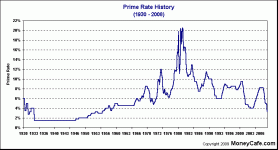Doubling within 12 months isn't a significant variation? I'm curious to see what correlation there would be between the periods on your chart that represent short-term troughs through rapid increases, versus periods of recession (or signifcant reduction in growth). I'm not postulating anything ground breaking...the whole point of the Fed's management of interest rates is to control inflation. But from both an investor's perspective and a business manager's perspective, "relatively" rapid changes in rates throw havoc into investment plans and make it difficult to manage leveraged capital in business.
Look at basic bond theory: if you had purchased a portfolio of mortgage bonds paying 3-4%, and within 12 months a similar bond is paying 5-6%, you've lost your @ss in that mortgage portfolio. And businesses that took on floating rate debt while rates were low, saw a doubling of their interest expense in just one business cycle. I've said it before: the economy was heading towards the crapper at the end of 2006 but there were enough businesses still doing ok, and trying to hang on that is wasn't clear then.
I don't think the opportunity for the four things you list would've been as lucrative if rates weren't as low as they were.
And on a more positive note :26: I think the state of Indiana has filed a lawsuit to slow down the Chrysler bankruptcy. Their pension fund is(was?) a secured creditor and they're looking for a more traditional handling of the bankruptcy proceedings instead of the White House cramdown. That'll be something to follow if it gains traction.
:seeya:

